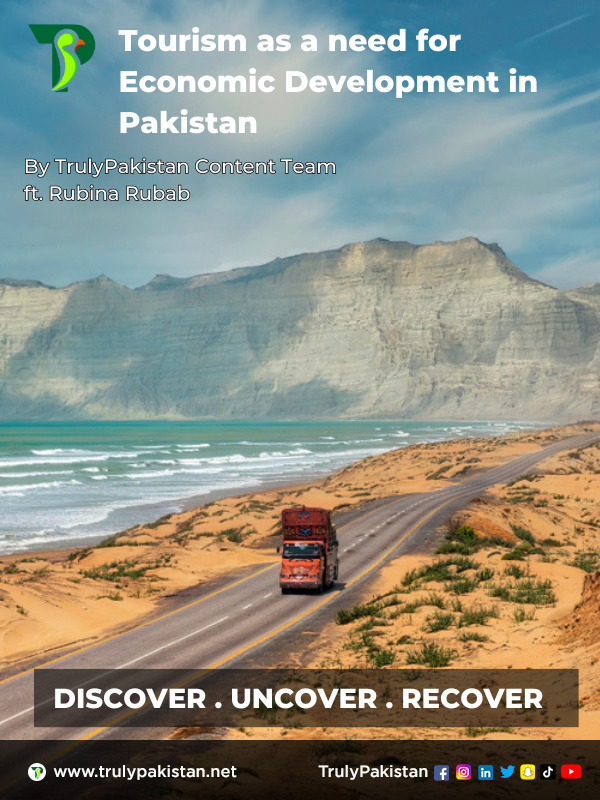Listen to the article in audio:
—
The Economic Impact of Tourism in Pakistan
Current Figures and Growth Prospects: Pakistan’s tourism industry is currently estimated to be worth USD 2.5 billion, a figure that is projected to rise to USD 4 billion within the next four years. These numbers underscore the substantial economic potential of the sector, which has largely remained untapped.
Pakistan’s tourism potential is bolstered by its remarkable natural beauty, which includes the awe-inspiring Himalayan and Karakoram mountain ranges, pristine lakes, lush valleys, and serene beaches. The crown jewel of Pakistan’s natural beauty is K2, the second-highest peak in the world, which draws adventure enthusiasts and mountaineers from across the globe.
Job Creation: One of the most significant benefits of a thriving tourism industry is its job-creating potential. Currently, tourism in Pakistan has already generated over 300,000 jobs, providing employment opportunities to a significant portion of the population. The government has ambitious plans to increase this number to 500,000 in the coming years, which is crucial in addressing the issue of youth unemployment.
These jobs span a wide range of sectors, including hospitality, transportation, food services, and handicrafts, contributing to the socio-economic development of the country.
GDP Contribution: The tourism sector is a significant contributor to Pakistan’s Gross Domestic Product (GDP). At present, it contributes approximately 5% to the nation’s GDP. However, as the industry grows and matures, this figure is expected to surpass 7%, making tourism a formidable driver of economic activity.
This substantial GDP contribution highlights the potential for tourism to become a central pillar of Pakistan’s economic development, alongside other major sectors such as agriculture and manufacturing.

Challenges and Government Initiatives
Security Concerns: One of the foremost challenges facing Pakistan’s tourism industry has been security concerns. The perception of Pakistan as an unsafe destination has deterred potential tourists. Security incidents in the past have contributed to this negative image.
To address this challenge, the government has been actively working on improving security measures in tourist areas. Enhanced security not only ensures the safety of tourists but also sends a positive message to the international community about Pakistan’s commitment to fostering a safe tourism environment.
Inadequate Infrastructure: Insufficient infrastructure has been another impediment to the growth of tourism in Pakistan. Inaccessible or poorly maintained roads, lack of modern airports, and limited accommodation options have hindered the development of a robust tourism ecosystem.
Recognizing this, the government has embarked on a mission to enhance infrastructure. Investments are being made in constructing and upgrading roads, building new airports, and establishing a wider range of accommodations. These developments are geared towards enhancing the overall tourist experience.
Limited Marketing Efforts: Effective marketing is crucial for attracting tourists to a destination. Pakistan has historically lagged in marketing its tourism potential on the global stage, which has resulted in it remaining relatively unknown to international travelers.
To rectify this, the government launched the “Visit Pakistan 2020” campaign and introduced more favorable visa policies to encourage tourists. These initiatives aim to raise Pakistan’s profile as a tourist destination and showcase its natural beauty and cultural richness.
The Role of Economic Development Corporation of Pakistan (EDCP) and Truly Pakistan
Identifying and Developing Tourist Destinations: The EDCP plays a pivotal role in promoting tourism as a means of economic development. Collaborating with various stakeholders, the EDCP identifies and develops tourist destinations that showcase Pakistan’s unique beauty and cultural heritage. The corporation assesses the potential of these destinations, invests in their development, and ensures they meet international standards in terms of facilities and services.
Truly Pakistan, in tandem with the EDCP, serves as a dynamic digital platform to highlight these destinations. It provides comprehensive information, immersive experiences, and a sense of unity among travelers, encouraging them to explore and appreciate the diverse attractions of Pakistan.
Preservation of Historic and Religious Sites: Pakistan boasts a rich cultural heritage, with numerous historic and religious sites of international significance. The EDCP is actively involved in the preservation and restoration of these sites, ensuring they are maintained for future generations and can be enjoyed by tourists.
Truly Pakistan complements these efforts by showcasing the cultural and historical treasures of Pakistan through multimedia content, fostering a deeper appreciation for the nation’s heritage among both domestic and international travelers.
Infrastructure Development: Building and upgrading infrastructure is a key focus of the EDCP. This includes improving road networks that connect tourist destinations, modernizing airports to facilitate easier access for international travelers, and expanding the range of accommodations available to tourists.
Truly Pakistan collaborates by providing up-to-date information on the state of infrastructure and connectivity, enabling travelers to plan their journeys more effectively.
Promotion of Public-Private Partnerships: The EDCP actively encourages public-private partnerships in the tourism sector. By collaborating with private sector stakeholders, the corporation seeks to leverage resources and expertise to accelerate the development of the tourism industry.
Truly Pakistan serves as a bridge for connecting businesses, entrepreneurs, and investors with the tourism sector, fostering economic empowerment and innovation.
International Engagement: To promote Pakistan on international forums and enhance its soft image, the EDCP is working to facilitate the participation of private tour operators in five major tourism expos starting from the next year. This international exposure will help position Pakistan as a desirable tourist destination and create a positive perception among potential visitors.
Truly Pakistan complements these efforts by serving as a digital platform that connects with global audiences, sharing stories, and experiences that showcase Pakistan’s unique allure.
Addressing Aviation Policy: The EDCP recognizes the need to address aviation policy issues that impact tourism. High airline fares have been a concern, and the corporation advocates for measures to control these costs. Furthermore, there is a call to allow neighboring countries’ airlines to operate in Pakistan, which could double revenue and introduce healthy competition within the airline industry.
Truly Pakistan can act as a channel for communicating and advocating for these policy changes, amplifying the voice of the tourism sector.
The Impact of Climate Change and the Way Forward
Climate Change Vulnerability: Pakistan is among the countries facing the highest risk of disasters due to global warming and climate change. This has resulted in serious damages to many heritage sites and natural landscapes in tourist areas.
The government, in collaboration with relevant agencies and organizations, needs to adopt climate resilience strategies to protect these assets and ensure their long-term sustainability.
World Tourism Day Celebration: The Pakistan Tourism Development Corporation (PTDC) marked World Tourism Day with a two-day conference in Islamabad. The event featured experts from the tourism industry participating in five panel discussions. These discussions covered a range of topics, including strategies for restoring tourism after natural disasters such as floods and widespread rains, removing bottlenecks to promote foreign tourism in Pakistan, and addressing issues and challenges in mountaineering and trekking tourism.
Truly Pakistan could play a role in documenting and sharing insights from such conferences, facilitating the exchange of knowledge and best practices among industry stakeholders.

Conclusion
Tourism is poised to become a major contributor to Pakistan’s economic development. Its capacity to create jobs, generate foreign exchange earnings, and promote regional development cannot be underestimated. The government’s commitment to promoting tourism, along with the active role of organizations like the Economic Development Corporation of Pakistan, is essential for unlocking the full potential of this sector. By addressing challenges, enhancing security, and investing in infrastructure, Pakistan can create a sustainable and inclusive economy while showcasing its natural beauty and rich cultural heritage to the world.In the digital age, Truly Pakistan emerges as a dynamic catalyst, seamlessly connecting travelers, businesses, and enthusiasts with the extraordinary opportunities presented by Pakistan’s travel and tourism industry. It complements the efforts of the government and organizations like the EDCP in showcasing Pakistan’s rich heritage, natural beauty, and economic potential.

